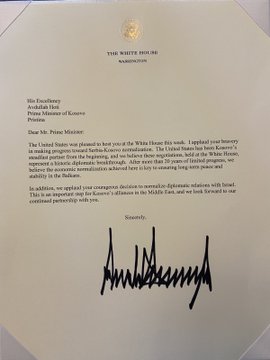



By Milica Stojanovic & Xhorxhina Bami*
Serbian and Kosovo leaders signed a landmark agreement on mainly economic issues on Friday at the White House on Friday – which President Trump called a historic move forward in relations.
September 4,2020-
Kosovo and Serbia signed an agreement on economic, energy and political issues at a ceremony observed by President Donald Trump in Washington on Friday.
President Trump claimed that Serbia and Kosovo had now “committed to an economic normalization”, calling the agreement “historic” and a “major breakthrough” after years of failed negotiations.
The agreement was signed after two days of meetings between delegations from Kosovo and Serbia in the US capital, hosted by US special envoy Richard Grenell and Trump’s national security advisor, Richard O’ Brien.
Although all the participants agreed the deal was mainly economic, it does contain some political points.
“We will only have good agreements,” Kosovo Prime Minister Avdullah Hoti said without further information, minutes before the signing ceremony.
Both sides agreed to continue work on earlier agreements on restoring air and rail links, signed at the start of the year, and to start building new connecting roads and highways.
They also agreed to work with the US on “a feasibility study for the purpose of sharing [the disputed] Gazivode/Ujmani Lake, as a reliable water and energy supply”.
Importantly, Serbia pledged to stop its campaign to get countries to “derecognise” Kosovo for one year, while Kosovo also promised to stop applying for membership of international organisations, also for a year.
Both Kosovo and Serbia agreed to work more on issues of missing persons, refugees and internally displaced persons from the 1990s Kosovo war.
On other foreign policy issues, in deference to US interests, both parties agreed to designate the Islamic group Hezbollah in its entirety as “a terrorist organisation” and prohibit the use of “5G equipment supplied by untrusted vendors in their communications network”, presumably referencing China.
On educational matters, the two countries agreed to accept each other’s higher education diplomas, among other things.
Serbian President Aleksandar Vucic thanked the US officials for “engaging in what few people want to do”, calling the deal a step forward.
“We did not solve our problems, but this agreement is an exceptional step forward,” Vucic said at the signing ceremony,
President Trump also signed two separate documents with Kosovo and Serbia to ensure US investment as a stimulus for more economic co-operation between Belgrade and Pristina.
Former Kosovo prime minister Ramush Haradinaj, whose party is part of the ruling coalition in Kosovo, said earlier on Friday that his party would not support the agreement if it contained a deal about use of Gazivode/Ujman lake.
“Unfortunately, one of the points of the draft agreement talks about Ujman has made the situation difficult. We do not appreciate Serbia being a party to the future of Ujman. …The implications this can bring in the future may be expensive for Kosovo,” Haradinaj wrote on Facebook.
Earlier, though all the participants previously said the talks had focused mainly on economic issues, Serbia’s Finance Minister, a member of the Serbian delegation, claimed the first draft of the document had contained a point on mutual diplomatic recognition.
Vucic assured the Serbian media on Thursday he would reject any agreement obliging Serbia to recognise the independence of its former province, which Belgrade sill claims as its territory.
Some experts warned BIRN that any deal focused only on economic issues, without reference to political disputes, might not work, as all the Kosovo-Serbia issues are widely seen as stemming from their political conflict.
After the first day of talks, US envoy Grenell said there had been some surprises at the talks but that neither “side was that surprised” – and surprises can be beneficial.
“Surprises are good. They press the sides to do more. We had some surprises but I don’t think either side was that surprised. They like to pretend before the media that they are more surprised than they actually are,” Grenell told Newsmax Adria TV.
A war from 1998-99 ending with the NATO bombing of Yugoslav positions forced Serbia to withdraw its police and armed forces from Kosovo, until then its southern province.
De facto semi-independent from then on, Kosovo declared independence from Serbia in 2008. Most Western countries, including the US, recognised it immediately. However, Russia, China and five EU countries have not recognised it, preventing it from joining the UN.
Negotiations between Kosovo and Serbia have lasted more than a decade, taking place in different formats, on different levels and with different outcomes.
Additional speed and force was given to the talks when President Trump appointed Grenell as his envoy to the dialogue in October 2019.
The first major outcome of this was a deal on restoring commercial flights between Belgrade and Pristina in January 2020, followed in February by an agreement to resume rail services.
Grenell said in June that the US and EU had now divided their tasks and roles in the Serbia-Kosovo dialogue, leaving the US to focus on the economy and EU to focus “on the political aspects of the dialogue”.
War crime charges filed against Kosovo President Hashim Thaci by the Hague-based Specialist Prosecutor’s Office have since changed the trajectory, with the EU now being the main facilitator. The next meeting in the EU-led Kosovo-Serbia talks is planned for Monday.
The signing of an agreement is, meanwhile, only a first step on the road to reconciliation as any agreement must then be enforced – and implemented.
*Balkan Insight
* Caption: Ceremony of signing the agreement in the White House. Photo: Twitter/@jeffmason1